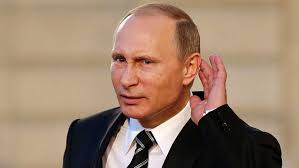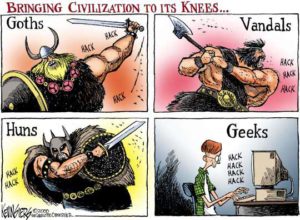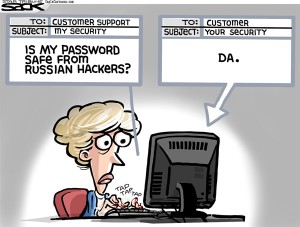(a short history of Russia’s information-age cyber tools)
6 April 2018 (Paris, France) – Whatever you might think of Russia’s recent antics on the world stage, you have to concede: they have brilliantly exploited information-age tools to confuse audiences about what is truth, what isn’t, and to set their own narrative. The returns have been massive … and out of all proportion to the modest investment (see Part 1 and 2 of this series).
If you look at all the latest examples in real-time … the Skripal poisonings, the Kremlin propaganda & that of its allies, and even Robert Mercer and the alt-right (far, far bigger threats to America than Russia) … what you see is the dumping out of a hundred narratives, hoping that each one takes 0.5% of the attention away from the truth. As Gary Kasparov said so eloquently in his book Winter Is Coming: Why Vladimir Putin and the Enemies of the Free World Must be Stopped:
Propaganda today is not a wall, not a dike holding back information from reaching the people. It is a flood, overwhelming our critical thinking. It is not to promote a narrative or agenda but to create doubt and to make people believe that the truth is unknowable.
The Kremlin goal … which the President of the United States embraces daily … is to exhaust our critical thinking, to hide the truth by seeding a thousand falsehoods around it.
No. Not quite the millennium we were promised. The data-bedazzled twenty-first century was to be a time of painlessly enhanced social justice and seamless market accommodation. Oh, that marvelous “arc of history” was surely bent unmistakably toward a bigger, shinier “Information Age”! The propaganda of progress!! The illuminism of new technologies!! Eh, no. Somebody clearly did not get the email.
As I noted in Part 1 and Part 2, Russia has spent decades tinkering with doctrines related to “information warfare”. One of the most fascinating presentations I found in my research was made in in 1997 by Vladimir Markomenko, then deputy director of FAPSI (then the signals intelligence agency and NSA equivalent) and outlined in Klimburg’s book. Markomenko defined the Russian view of “information war” along four dimensions:
- information warfare-electronic warfare
- intelligence
- hacker warfare, and
- psychological warfare
All have been put on display in recent conflicts.
Russia’s wars in Ukraine and the Baltic states

Last year the media made a big thing about a Canadian military deployment: 450 soldiers to Latvia and leading a NATO battle group that will include forces from Albania, Italy, Poland, Slovenia and Spain. They will liaise closely with other battle groups in the region led by Germany, the U.K., and the U.S. The purpose: to collectively demonstrate NATO resolve against any physical incursion into the Baltics. It was an easy sell, politically. Deterrence, reassurance and confidence-building. RAH, RAH!!
But counter-insurgency (Afghanistan), counter-terrorism (Daesh), peace-restoration (UN) … well, a bit tougher to sell. As Brett Boundreau, an analyst for Veritas, puts it:
Oh, this was easy. The Baltic states are democratic, enjoy a high quality of life, and are deeply supportive of the deployment. There are no dams to rebuild, no schools to repair, no humanitarian support needed, and no villages to wrest from insurgent groups. Piece of cake.
Well, CNN was certainly pissed off. I mean, did anybody see Wolf Blitzer reporting from his infernal “Situation Room” on all those “being there” activities: neighborhood patrols, hockey games amongst soldiers, Eurovision parties? Damn! How about some special operations forces helping to direct fire onto Daesh positions!
Russia is far too clever to send troops across the border of a NATO member. No matter how ambivalent Emperor Trump seems to be about Europe, somebody would trigger the Article 5 provision and a strong military response would be the rage.
No, instead, the Canadian deployment was targeted with a significant disinformation campaign of industrial scale and scope. The “information effect” is central to Russian operational efforts. As I noted earlier in this series, their capability is massively resourced, remarkably well done, and is always “on”, across multiple information channels, backed by the fearless use of diplomacy, military and economic instruments of national power.
As I learned from chatting with some sources at the U.S. Cyber Command and NATO contacts, the West has been exceedingly slow to evolve a response to these new threats. Yes, we have seen some major investment in cyber defence. But the military mindset is still based on a career of training for physical battlegrounds and the use of kinetic weapons, not missions fought in the information space. One thing I learned from a source at the EU’s Cyber Command unit, it has been a struggle to change the organization, structure, doctrine and policies necessary to best employ and empower our capabilities to fight today’s internet-driven, inform-influence-persuade campaigns.
Bang, straight on: communications technology, particularly the Internet and smart phones, has changed how operations are conducted — particularly non-combat missions — and has evolved much faster than our military forces and security institutions have been able to adapt.
So how were the Canadians prepared and what types of things does Russia have in its informational arsenal? Here is a “laundry list” from several sources based on Russian activity across the Baltic states, and used in Ukraine:
- Beware bad behavior on the part of any military personnel. It will be used to discredit everybody and wasted to great effect in Ukraine; fictitious improprieties were created and split the populace.
- Watch for “honey-traps,” stories of women being molested or raped, reference to occupying forces and the ‘mistreatment’ of the local Russian-speaking population. Again, in Ukraine, media outlets were flooded with these stories.
- A favorite: thugs may be hired to elicit reactions by soldiers including fighting: these ‘impromptu’ events will be filmed and used against military forces. We have five such incidents in the Ukraine campaign.
- On-line news sites will feature massive amounts of commentary from “trolls,” people paid to engage in and dominate the on-line space. Spouses of deployed members might be phoned and told their loved one has died (it has been done many, many times before; the Russians know exactly how to obtain this information). Soldiers could receive legitimate-looking emails or posts claiming a major crisis at home requiring their immediate attention.
- Social media accounts of soldiers will be studied for vulnerabilities, and exploited. This is all carefully designed to destabilize, distract and discredit. [Note to readers: apropos today’s headlines, Russian intelligence knows exactly how to “scape” Facebook and Twitter and other social media to find/create profiles on soldiers’ families; more in my concluding Part 4]
Yes, NATO is planning. They are hoping to deploy not a platoon of infantry but a platoon of communications practitioners, deploying spokespersons fluent in Russian and Latvian and embedded staff with long experience of serving or living in the region. They hope to monitor media and social media 24/7 in Russian, the Baltic languages, and those of countries providing forces. But that rollout (as of this date) had been only partial.
Coming in Part 4, the conclusion to this series
As far as Russia’s info-warfare and election interference in the West, the thing that Putin fears most – the spread of democracy and specifically Western liberal democracy – has become confused and splintered because of his actions. That’s a serious return-on-investment for him. Sort of an answer to that meme “What if they had a war and only one side showed up?”

